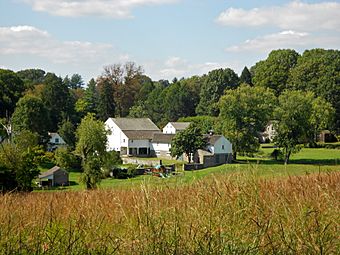Idlewild Farm Complex facts for kids
Quick facts for kids |
|
|
Idlewild Farm Complex
|
|
 |
|
| Location | 617 Williamson Rd., Bryn Mawr, Pennsylvania |
|---|---|
| Area | 26 acres (11 ha) |
| Built | 1740, although original building was built in 1699. |
| Architectural style | Georgian |
| NRHP reference No. | 84003505 |
| Added to NRHP | January 20, 1984 |
The Idlewild Farm Complex is a historic farm covering about 26 acres in Bryn Mawr, Pennsylvania. It was once part of a large area called the Welsh Tract. Today, it is part of the Bridlewild Trails Association, which helps protect natural areas.
Contents
Idlewild Farm: An Old Pennsylvania Homestead
The First Farmers: The Lloyd Family
In 1698, a Welsh farmer named Robert Lloyd received 400 acres of land. This land was near a road now known as Black Rock Road. Around 1700, Robert built a small, one-room house with a loft. This house had a special beehive oven and a large walk-in fireplace. These were important for cooking and keeping warm back then.
Robert and his wife, Lowry, had eight children while living on the farm. They worked hard to make the farm successful. Sadly, Robert Lloyd passed away in 1714.
Growing the Farm: New Owners and Buildings
After Robert's death, his wife Lowry remarried. Her new husband added another part to the house in 1717. A wooden barn was also built around this time.
Over the next 100 years, the farm had several different owners. Each new owner often added something new. In 1825, the wooden barn was replaced with a stronger stone barn. The two parts of the farmhouse were also connected that same year. A special building for wagons was added in 1827.
Eventually, a man named John Williamson bought the farm. Williamson Road, where the farm is located, is named after him. In 1860, he added a springhouse at the bottom of a hill. A springhouse was a cool place to store food and get fresh water. When John Williamson died in 1864, his two sons, Garret and Samuel, shared the farm. Garret later sold his part to Samuel. Samuel then added more buildings, including a carriage house, a milkhouse, a bull pen, and a horse stable.
The Saunders Family Era
A New Vision for the Farm
In 1897, Frances Saunders bought the farm, which was then called Idylwild Farm. She was the wife of a medical publisher named Walter Saunders. She bought 87 acres of the farm's remaining 104 acres. Around 1900, the farm changed from growing crops and raising horses to being a dairy farm. They raised a special type of cow called Ayrshire cows.
The Saunders family had a main house in Philadelphia. However, they wanted Idlewild Farm as a place to work and relax during the summer. For example, they dug a swimming pool in 1924, which is still there today! Mrs. Saunders bought more land nearby, making the farm grow to 167 acres. She tried to keep most of the old buildings as original as possible. Even though she was losing her hearing, she continued to work on the farm. In 1927, Walter Saunders gave the farm to their children, Lawrence and Emily.
Lawrence Saunders and Land Preservation
Lawrence Saunders married Dorothy Love in 1924. They moved to the farm and continued the dairy business. In 1927, Lawrence started the Bridlewild Trails Association on the property. This group helps create and maintain trails for people to enjoy nature. In 1951, he also created the Saunders Foundation. This foundation helps protect a piece of land called Saunders Woods, which he had bought in 1922.
Lawrence Saunders passed away in 1968. He left the farm to his estate. His wife, Dorothy Saunders, then bought 26 acres of the farm from the estate. She loved farm life, wrote poetry, and continued to work on the farm. A book of her poems, called "Unbroken Time," was written at Idlewild and published in 1982.
Idlewild Farm: A Historic Landmark
In 1983, Idlewild Farm was officially added to the National Register of Historic Places for Pennsylvania. This means it is recognized as an important historical site. In 1992, Mrs. Saunders gave both Saunders Woods and 21 acres of Idlewild Farm to the Natural Lands Trust. This is a non-profit group that works to protect land in southeastern Pennsylvania and southern New Jersey.
 | Roy Wilkins |
 | John Lewis |
 | Linda Carol Brown |



